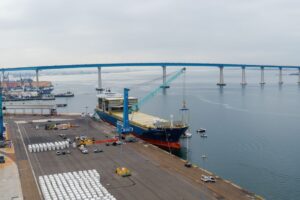As one of the largest gold producers in Africa, mining is a core industry for Ghana which has seen vast expansion over the years. However, as mining operations expanded, a need for regulation and support for the various stakeholders within Ghana’s mineral industry became essential to help maintain the development of the country on a national and international level. Consequently, the Ghana Chamber of Mines was established as an industry-led ‘think-do-tank’ which works to foster shared prosperity across the mining industry for current and future generations of Ghanaians. We got a chance to catch up with Mr. Sulemanu Koney, Chief Executive Officer (CEO) of the Ghana Chamber of Mines, to appreciate the crucial work the Chamber is doing to unite the industry and promote Ghana as a key mineral mining hub.
Founded in 1928, the Ghana Chamber of Mines has worked over the last 95 years to deepen the linkages between the mineral and non-mineral sectors, with a goal to unlock, internalize and equitably distribute the wealth of Ghana’s mining and minerals supply chain. Through its work to bring together its member companies, the Chamber facilitates cooperation between the government and non-state stakeholders to improve the governance of the minerals sector on a large scale whilst catalyzing the industry’s input demands towards a future of industrialization. Members of the Chamber include all companies which are involved in mineral exploration, production, processing and allied services, and so, the Chamber is made up of the majority of Ghana’s mineral output companies.
The Chamber has a clear mission to represent the mining industry across Ghana by using the resources and capabilities of its members to deliver services which benefit these businesses, government and communities in a manner that ensures sustainable development. On a global scale, the Chamber collaborates with peers across the West African sub-region and liaises with players in other jurisdictions to ideate on establishing and promoting the best practices in governance and regulation in the mining industry. The Chamber is committed to supporting its members, and by extension the country, as it promotes an information-driven, people-centred, and development-oriented industry where members and all key stakeholders’ interests are promoted. Outside of Africa, the Chamber leverages its membership of the International Council of Mining and Metals to spearhead the mining with principles agenda to make mining more beneficial to the global community.
In speaking with Mr. Koney, he highlighted the Chamber’s current two research projects with the first looking at identifying and measuring the value of the mining sector’s supply chains and core mining activities. As part of this research, the Chamber is looking at linkage opportunities between mining and the non-mineral economy which have the potential to anchor national development policies and how to leverage this for Ghana-registered input manufacturers and service providers to make forays into West Africa. The Chamber has engaged the University of Mines and Technology (UMaT) and the Africa Centre for Energy Policy (ACEP) on these initiatives. UMaT is leading a research project to map the linkages between the mining sector and the non-minerals sector whilst ACEP is focusing its study on researching how to position Ghana as the hub of mining support services within Western Africa. These research projects will allow the Chamber to better integrate the mining sector into the larger economy and help build on the reputation of Ghana as a key mining hub in Africa.
The second crucial research area is aimed at improving the mining and processing of minerals to yield overarching outcomes for the industry. Funded by the Ghana Chamber of Mines’ Tertiary Education Fund (TEF) and the Chamber’s Chair of Environmental Studies, the TEF is providing more than $2 million over a 5-year period to UMaT to support the development of infrastructure, research, teaching, and other ancillary educational services. Consequently, the Chamber continues to work with key research institutions to develop the mining industry, whilst looking at ways to establish Ghana as a Centre for mining and mining services globally.
As the Chamber continues to position mining as a central catalyst for development, it focuses on providing advocacy and critical support to its members to move Ghana’s mining industry towards a more responsible and sustainable path. It believes strongly that collaborative decision-making is the way forward, along with a shared responsibility for the management of inherent social, environmental, and governance issues. The TEF plays a significant role in the development of the industry by developing a pipeline of human capital armed with the requisite knowledge, skills, and exposure to sustain the industry. Further, through the beneficiary-driven corporate social investments (CSI) of its producing member companies, the Chamber is committed to enhancing the outcomes of mining for local communities and the larger country.
Mr. Koney highlighted in our discussion the collective CSI causes that the Chamber undertakes towards the betterment of both the mining industry and the Chamber. This includes the Tertiary Education Fund which was launched in 2019, and as previously mentioned, through which the allocation of more than $2 million over a period of 5 years, aims to advance teaching and learning of mining and related disciplines in tertiary institutions. The areas of support under TEF include infrastructural development, research, educational resources, and bursaries. Mr. Koney comments on this, “Personally, what excites me about the TEF is the opportunity we provide to faculty members and students to intern with the various mines. I recently visited one of our members’ mines where I had the chance to interact with a female employee who was a product of TEF”.
The Chamber’s funding and support are not exclusive to TEF, as many developments and infrastructure projects are also funded by its members. These projects include investments in roads, education, and healthcare, as well as the establishment of skills training centres. These expenditures, in 2022, totaled $43 million, and contributed to enhancing livelihoods in host communities and making them resilient.
As can be seen, the Ghana Chamber of Mines is actively working to bring all the stakeholders across Ghana’s mining industry together in line with its vision to be the respected and unified voice of the industry that offers services to stakeholders in a manner that deepens sustainable development.
Therefore, with the aim of establishing Ghana as a key mining hub, the Chamber aims for inclusive growth and development of the country’s development that pulls along other sectors of the economy to help diversify the economy.
We look forward to catching up with Mr. Koney and the Ghana Chamber of Mines in the coming years to see how the Chamber’s critical role continues to broaden the socio-economic development of Ghana.








